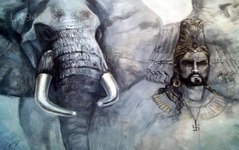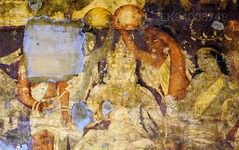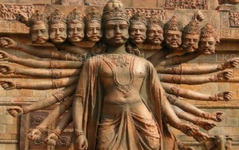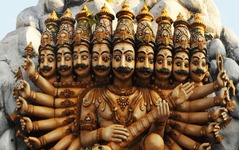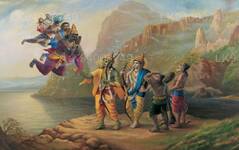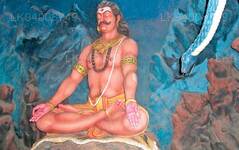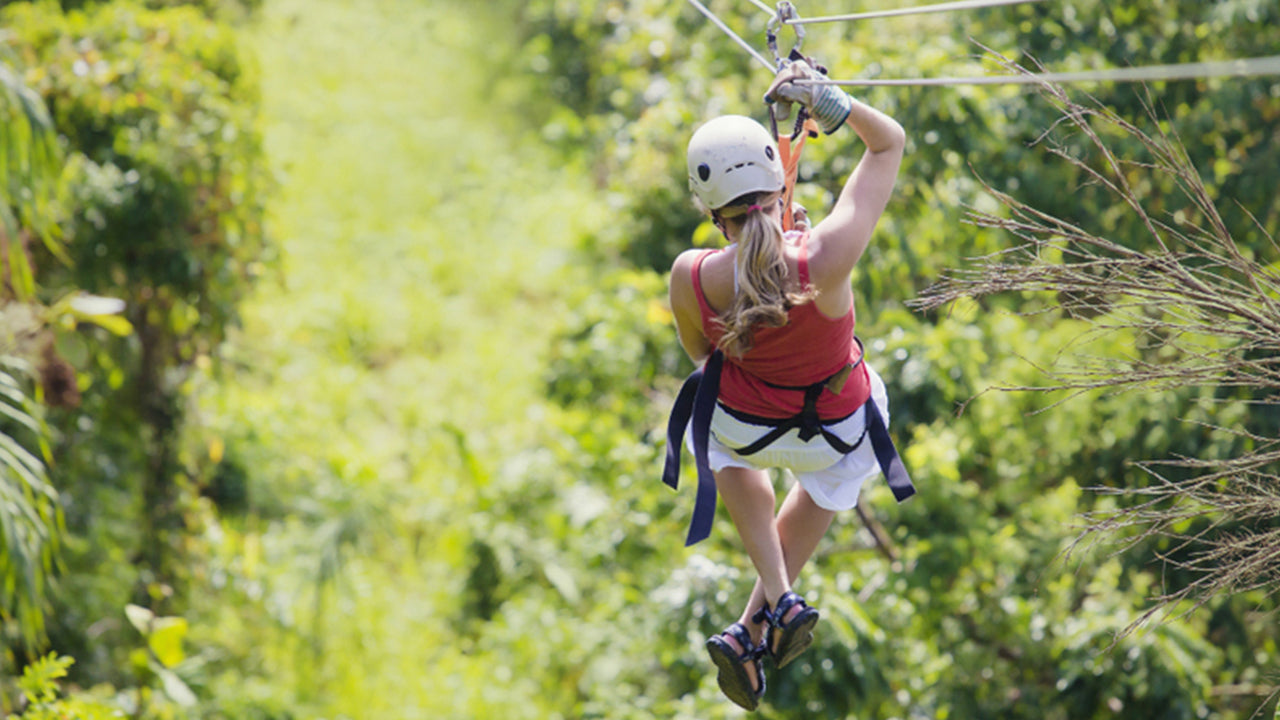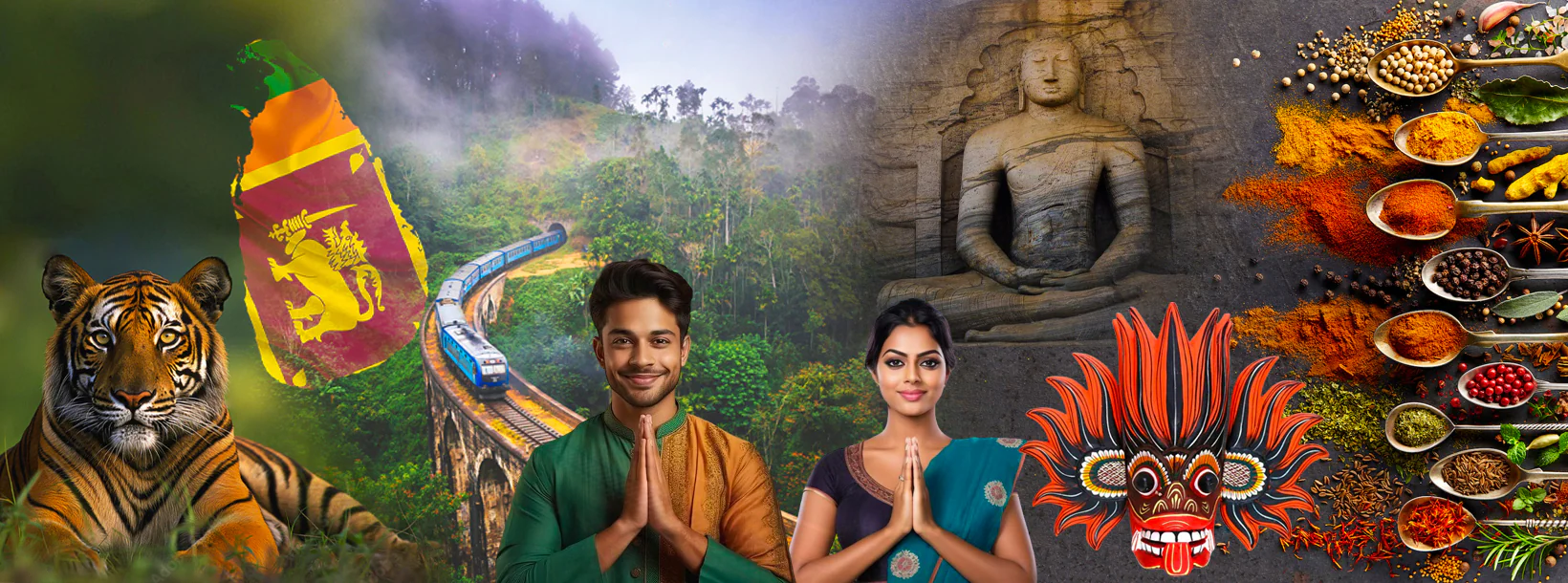
Sri Lanka
Sri Lanka, an island nation in South Asia, is renowned for its rich cultural heritage, diverse landscapes, and wildlife. Attractions include ancient temples, pristine beaches, lush tea plantations, and vibrant festivals. The country's unique blend of cultures, warm hospitality, and delicious cuisine make it a captivating destination for travelers.
Ravana
Ravana is a rakshasa (a demonic creature in Hindu mythology) king of the island of Lanka, and the chief antagonist of the Hindu epic Ramayana and its adaptations.
The life of Ravana, one of the most powerful beings ever to roam the universe, if Hindu legends are to be believed, had unfolded in the small island Sri Lanka, where he ruled with mighty power over gods, humans and demons. Valmiki’s Ramayana paint Ravana as a tyrant of mighty power who was holding the gods at ransom, and he continues to be treated as a blackguard in India even today. In the classic text, he is found kidnapping Rama's wife Sita, to claim vengeance on Rama and his brother Lakshmana for having cut off the nose of his sister Surpanakha. Yet Ravana of Sri Lanka is portrayed to be a different king and a human. He is described as a devout follower of the god Shiva, a great scholar, a capable ruler and a maestro of aveena, known as the ravanhattha. The story goes that Ravana in order to please his mother had decided to bring the mountain Kailash to Sri Lanka.
In the Ramayana, Ravana is described to be the eldest son of sage Vishrava and rakshasi Kaikesi. He abducted Prince Rama's wife Sita and took her to his kingdom of Lanka, where he held her in the Ashok Vatika. Later, Rama, with the support of vanara King Sugriva and his army of vanaras, launched an invasion against Ravana in Lanka. Ravana was subsequently slain and Rama rescued his beloved wife Sita
Ravana is widely portrayed to be an evil character, though he also has many qualities that make him a learned scholar. He was well-versed in the six shastras and the four Vedas.Ravana is also considered to be the most revered devotee of Shiva. Images of Ravana are seen associated with Shiva at some temples. He also appears in the Buddhist Mahayana text Laṅkāvatāra Sūtra, in Buddhist Ramayanas and Jatakas, as well as in Jain Ramayanas. In some scriptures, he is depicted as one of Vishnu's cursed doorkeepers.
Life and legendsBirth
Ravana was born to the great sage Vishrava (or Vesamuni, or Virulaha), and his wife, the Rakshasa princess Kaikesi in the Treta Yuga. People of Bisrakh village in Uttar Pradesh claim that Bisrakh was named after Vishrava, and that Ravana was born there. But according to Hela historical sources and folklore, Ravana was born in Lanka, where he later became king
Ravana's grandfather on his father's side, the sage Pulastya, was one of the ten Prajapatis or mind-born sons of Brahma and one of the Saptarishi (Seven Great Sages Rishi) in the first Manvantara (age of Manu). His maternal grandfather was Sumali (or Sumalaya); the king of the Rakshasas and the son of Sukesha. Sumali had ten sons and four daughters. Sumali wished Kaikeshi to marry the most powerful being in the mortal world, so as to produce an exceptional heir. He rejected the kings of the world, as they were less powerful than he. Kaikesi searched among the sages and finally chose Vishrava, the father of Kubera. Ravana and his siblings were born to the couple. They completed their education from their father, with Ravana being a great scholar of the Vedas
Family
Ravana had seven brothers and two sisters
- Kubera - The King of the North direction and the Guardian of Heavenly Wealth. He was an older half-brother of Ravana. Kubera was born to Vishrava's other wife, Ilavida.
- Kumbhakarna - One of the most jovial demons in Hindu mythology. When offered a boon by Brahma, he was tricked into asking for eternal sleep. A horrified Ravana, out of brotherly love, persuaded Brahma to amend the boon. Brahma mitigated the power of the boon by making Kumbhakarna sleep for six months and being awake for the rest six months of a year (in some versions, he is awake for one day out of the year). During the war with Rama, Kumbhakarna was untimely awakened from his sleep. He tried to persuade Ravana to open negotiations with Rama and return Sita to him. But he too failed to mend the ways of Ravana. However, bound by a brother's duty, he fought on the side of Ravana and was killed in the battlefield. Before dying he met Vibhishana and blessed him for following the path of righteousness.
- Vibhishana - A follower of Rama and one of the most important characters in the Ramayana. As a minister and brother of Ravana, he spoke the truth without fear and advised Ravana to return the kidnapped Sita and uphold Dharma. Ravana not only rejected this sane advice but also banished him from his kingdom. Vibhishana sought protection from Rama, which was granted without hesitation.
- Khara - King of Janasthan. He was a cousin of Ravana and the son of Kaikesi's sister Raka.
- Dushana - Viceroy of Janasthan. Cousin of Ravana and twin brother of Khara.
- Ahiravan - In Krittivasi Ramayan, Ahiravan was king of the Underworld ruled by the rakshasas by Ravana and the demon king Maya.
- Kumbhini - The older half-sister of Ravana and the wife of the demon Madhu, King of Mathura. She was the mother of Lavanasura.
- Sahastra Ravana - He is mentioned in Adbhuta Ramayana as the elder brother of Ravana, one thousand armed and thousand-headed, living on an island named Pushkar, he was much more powerful than his younger brother. He is slain by Sita who takes the form of Mahakali to slay him.
- Shurpanakha - The sister of Ravana. She was the ultimate root of the kidnapping of Sita. She was the one who instigated her brothers to wage a war against Rama.
- Ravana was married to Mandodari, the daughter of the celestial architect Maya, Dhanyamalini, and a third wife
He is described as a devout follower of the god Shiva, a great scholar, a capable ruler and a maestro of aveena, known as the ravanhattha. The story goes that Ravana in order to please his mother had decided to bring the mountain Kailash to Sri Lanka. As he lifted up the mountain, God Shiva was angered by his arrogance and pushed it back down, trapping Ravana. The King of Lanka had torn off one of his own arms and made a musical instrument, ripping out sinews to form the strings. He used the newly invented ravanhattha to sing the praises of Shiva, creating music of such beauty that Shiva wept and forgave him.
legendsAs Vishnu's cursed doorkeeper
In the Bhagavata Purana, Ravana and his brother, Kumbhakarna, were said to be reincarnations of Jaya, and Vijaya, gatekeepers at Vaikuntha, the abode of Vishnu and were cursed to be born in Earth for their insolence.
These gatekeepers refused entry to the Sanatha Kumara monks — who, because of their powers and austerity, appeared as young children. For their insolence, the monks cursed them to be expelled from Vaikuntha and to be born on Earth.
Vishnu agreed that they should be punished. They were given two choices, that they could be born seven times as normal mortals and devotees of Vishnu, or three times as powerful and strong people, but as enemies of Vishnu. Eager to be back with the Lord, they choose the latter one. Ravana and his brother Kumbhakarna were born to fulfill the curse on the second birth as enemies of Vishnu in the Treta Yuga. The curse of first birth was fulfilled by Hiranyakashipu and his brother Hiranyaksha in Satya Yuga when they were both vanquished by earlier avatars of Vishnu (Hiranyaksha by Varaha and Hiranyakashipu by Narasimha) and the curse of third birth was fulfilled by Dantavakra and Shishupala in the Dvapara Yuga when they both were slain by Krishna, the eighth avatar.
Texts attributed to RavanaAstrology
There are also texts attributed to Ravana. The Ravan Samhita is an astrological text or scripture narrated by Shiva and written by Ravana.
Medicine
The Ravanakumara Tantra is a part of the tantric rituals of the Kriyakalagunottara Tantra, and it is an 11th-century Sanskrit work for the treatment of children's diseases. It is also known as the Ravanaproktabalacikitsasutra ("Sutra Spoken by Ravana on the Curing of Children's Diseases").
Ravana appears as the composer of the 16th century C.E. text, Arka Prakasa, which is a dialogue between the king of Lanka and his wife Mandodhari about which herbs and chemicals can be used in a mixture to cure illnesses, such as syphilis.
Ravana is also the composer of the 16th century C.E. scriptures Nadi Pariksa and Nadi Vijnana on knowledge about the veins.
Linguistics
Ravana is the composer of the Ravanabhet, a Vedic text on the phonetics of the Sanskrit language.
Ravana is also the composer of the Ravaniya, also known as Ravanabaith, a text on the phonetics of the Telugu language.
The Prakrta-Kamadhenu grammatical text on the Prakrit language is attributed to "Ravana Lankesvara"
Spirituality
The Samkhya scripture known as the Ravana-bhasya, also known as Ravanabhasya, is believed to be written by Ravana.
The Vaisesika scripture Katandi (a commentary on the Vaisesika Sutra) is attributed to Ravana.
Ravana is also the name used by a commentator of the Shaiva Rudrapurascharana.
"Ravanacharya" is the scholar who wrote the Padaratna, a commentary on the Rig Veda.
Ravana is the composer of the Shavite scripture Shiva Tandava Stotram

